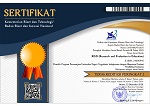Developing an instrument for measuring the faith of the students of Islamic senior high school
DOI:
https://doi.org/10.21831/reid.v2i2.11117Keywords:
faith, scale, measurement, validity, reliabilityAbstract
References
Al-Bukhari, A. (tt.). Shahih al-bukhari, Juz I, Mesir: Dar Ihya al-Kutub.
Allen, D.E., Guy, F.F. & Edgley, C.K. (1980). Social psychology as social process. Belmont, TN: Wadsworth.
Allport, G.W. (1935). Attitudes. In Murchison (ed.) Handbook of social psychology. Worcester, MA: Clark University Press.
Audah, A. (2003). Konkordansi qur'an: Panduan kata dalam mencari ayat Qur'an. Bogor: Pustaka Litera Antar Nusa.
Azra, A. (2002). Paradigma baru pendidikan nasional: Rekonstruksi dan demokratisasi. Jakarta: Kompas.
Azwar, S. (1995). Sikap manusia: Teori dan pengukurannya. Yogyakarta: Pustaka Pelajar.
Bogardus, E.S. (1931). Fundamentals of social psychology. New York, NY: Century.
Ensiklopedi Islam. (2002). Ensiklopedi Islam, Jilid 2. Jakarta: Ichtiar Baru Van Hoeve.
Fishbein, M. & Ajzen, I. (1975). Belief, attitude, intention and behavior: An introduction to theory and research. London: Addison, Wesley.
Fishbein, M. & Ajzen, I. (1980). Understanding attitude and predicting social behavior. New York, NY: Englewood Cliffs, Prentice Hall.
Hadjar, I. (2010). Evaluasi hasil belajar afektif pendidikan agama: Konsep dan pengukuran. In M. Muntholi'ah, A. Rahman, & M.R. Chamami (Eds.), Guru besar bicara: Mengembangkan keilmuan pendidikan Islam. Semarang: RaSAIL.
Hill, P.C. & Hood, R.W. (Eds.). (1999). Measures of religiosity. Birmingham: Religion education Press.
Holland, J.C., Kash, K.M., Passik, S., Gronert, M.K., Sison, A., Lederberg, M., ... Fox, B. (1998). A brief spiritual belief inventory for use in quality of life research in life-threatening illness. Psychooncology, 7(6), 460-469.
Ibn Taymiyyah, A. (nd.). Al-tuhfah al-"˜iraqiyah fi al-"˜amal al-qulub, Beirut: Dar al-Kutub al-"˜Ilmiyah.
Ibn Taymiyyah, A. (nd.). Al-tuhfah al-"˜iraqiyah fi al-"˜amal al-qalbiyah, Riyadh: Maktabah al-Rusyd.
Ibn Taymiyyah, A. (2003). Kitab al-iman, Cairo: Dar al-Hadits.
Ilyas, Y. (2007). Kuliah aqidah Islam. Yogyakarta: Lembaga Pengkajian dan Pengamalan Islam (LPPI) UMY.
Izutsu, T. (1994). The concept of belief in islamic theology: A semantical analysis of iman and islam. (A.F. Husein, et al., Trans.). Konsep kepercayaan dalam teologi islam: Analisis semantik iman dan islam. Yogyakarta: Tiara Wacana.
Mas'ud, A. (2002). Menggagas format pendidikan non dikotomik: Humanisme religius sebagai paradigma pendidikan Islam. Yogyakarta: Gama Media.
Masri, A.J. & Priester, P.E. (2007). The development and validation of a Qur"˜an-based instrument to assess Islamic religiosity: The religiosity of Islam scale. Journal of Muslim Mental Health, 2, 177-188.
Plante, T.G. & Boccaccini, M.T. (1997). The santa clara strength of religious faith questionnaire. Pastoral Psychology, 45, 5.
Shaw, M.E. & Wright, J.W. (1967). Scales for the measurement of attitudes. New York, NY: McGraw Hill.
Downloads
Published
How to Cite
Issue
Section
Citation Check
License
The authors submitting a manuscript to this journal agree that, if accepted for publication, copyright publishing of the submission shall be assigned to REID (Research and Evaluation in Education). However, even though the journal asks for a copyright transfer, the authors retain (or are granted back) significant scholarly rights.
The copyright transfer agreement form can be downloaded here: [REID Copyright Transfer Agreement Form]
The copyright form should be signed originally and sent to the Editorial Office through email to reid.ppsuny@uny.ac.id

REID (Research and Evaluation in Education) by http://journal.uny.ac.id/index.php/reid is licensed under a Creative Commons Attribution-ShareAlike 4.0 International License.







.png)





